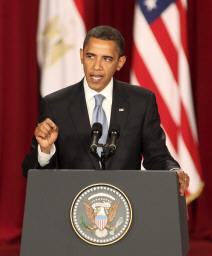The visit to the Middle East by President Barack Obama has demonstrated how a sharp division exists between the moderate Islamic world and Muslim extremists, Italian Foreign Minister Franco Frattini said on Thursday.
Obama's meeting with the heads of Saudi Arabia and Egypt, Frattini observed, ''has clearly demonstrated that there does not exist a clash between two cultures, the West and the Muslim world, but one within Islam'' between moderates and extremists.
''At the same time the president of the United States is being received by the King of Saudi Arabia and the president of Egypt, leaders of two of the most moderate Arab-Muslim countries, we hear proclamations by Osama bin Laden which demonstrated the clear division which exists in the Islamic world,'' Frattini said.
''On the one hand we have the Islamic extremists who support terrorism, while on the other we have the moderates who represent a true talking partner,'' the foreign minister added.
OBAMA OPENS TO MUSLIM WORLD.
In a landmark speech in Cairo on Thursday, Obama called for a new era of relations and dialogue between the West and the Muslim world, one no longer marked by hostility and distrust but based on mutual respect and interest.
He also reiterated his support for a two-state solution for Israel and Palestine and called for Palestinians to end their violence against Israelis and for Israel to end its settlement policy in the Occupied Territories.
While America's support of Israel was ''unbreakable'', Obama said, the conditions Palestinians were forced to live in were ''intolerable''.
In regard to Iraq and Afghanistan, Obama said that the US was there only because of the presence of extremist forces and was ready to leave as soon as this risk no longer existed.
Turning his attention to Iran's nuclear ambitions, Obama said Tehran had a right to take advantage of nuclear technology for peaceful purposes but in order to do so had to adhere to the nonproliferation pact.
In his address, Obama recalled his own Islamic roots, notign that his father was a Muslim from Kenya, and the period he lived in an Islamic country, Indonesia, and repeatedly quoted from the holy books of the three monotheistic religions - the Koran (Islam), Talmud (Judaism) and Bible (Christianity).
The president stressed the need for religious freedom and tolerance and placed these on the same level as the need to respect human rights and sexual equality.
Speaking after Obama's address, Italian Foreign Undersecretary Margherita Boniver said ''we knew he would give a very high profile speech. But his address was discourse for peace, dialogue and cooperation and stood out above all for his deep understanding of the many problems which afflict the Middle East''.









